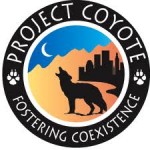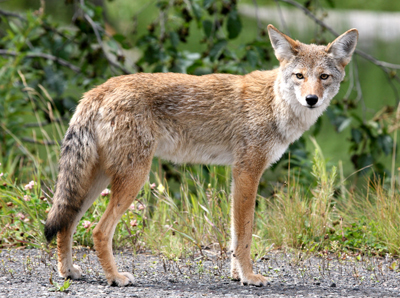We’ve had a lot of discussion in our community about how to live with coyotes, and how to keep them away from homes and pets. To help consider these questions, the Seaside Gardeners of Squantum invite you to a presentation by Chris Schadler of Project Coyote. Learn about successful approaches to peaceful coexistence and bring your questions.
 Project Coyote: promoting coexistence between people and wildlife
Project Coyote: promoting coexistence between people and wildlife
Wednesday, October 15, 2014, 7pm
The Kennedy Center
440 E. Squantum Street, N. Quincy, MA
RSVP
To guarantee seating, please RSVP by emailing Sandra Sumner.
About Project Coyote
Project Coyote, a North American coalition of wildlife scientists, educators, predator- friendly ranchers and community leaders, promotes compassionate conservation and coexistence between people and wildlife. As a national non-profit organization, Project Coyote works to change negative attitudes toward coyotes, wolves and other native carnivores by replacing ignorance and fear with understanding, respect and appreciation. All of our work – through education, science, and advocacy – strives to create fundamental and systemic changes in the ways wild carnivores are viewed and treated in North America.
About Chris Schadler, Wild Canid Ecologist
Chris’ interest in wild canids began in 1980 as a volunteer at the Wolf Park in Battleground, Indiana under Dr. Erich Klinghammer. This opportunity and others inspired an eventual Masters in Conservation Biology at Antioch University Graduate School. Chris instructs and mentors adult degree candidates in the UNH System at Granite State College.
While wolf recovery was the focus of her early work, Chris’ attention shifted to the eastern coyote when she moved to New England. She chose a farm with known coyote problems to raise sheep and train her border collies. Using sound livestock management and common sense, she has avoided any predation for nearly two decades. A peaceful co-existence between coyote and livestock has grown an attentive audience for humane management.
Tips and education from Project Coyote on their website.
Be Coyote Aware: Flyer
Tips to make your home less attractive to coyotes:
Urban landscapes offer an abundance of food, water, and shelter for coyotes. Take the following steps to prevent coyotes from being attracted to your home.
- Wildlife-proof garbage in sturdy containers with tight fitting lids.
- Don’t leave pet food outside.
- Take out trash the morning pick up is scheduled.
- Keep compost in secure containers.
- Keep fallen fruit off the ground. Coyotes eat fruit.
- Keep birdseed off the ground; seeds attract rodents which then attract coyotes. Remove feeders if coyotes are seen in your yard.
- Keep barbecue grills clean.
- Eliminate accessible water sources.
- Clear away brush and dense weeds near buildings.
- Close off crawl spaces under decks and around buildings where coyotes may den.
- If you frequently see a coyote in your yard, make loud noises with pots, pans, or air horns, and haze the coyote with a water hose.
- Share this list with your neighbors; coexistence is a neighborhood effort.
Photo: By Jitze via Wikimedia Commons

